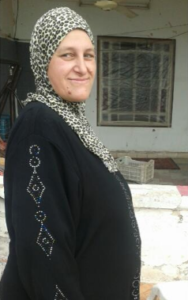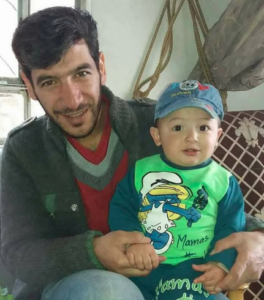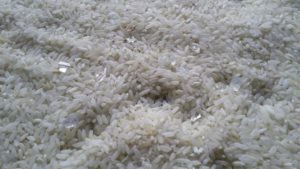Madaya: One Year After the Front Pages. It’s Even Worse Now.
This year [2017] is worse than the last 2 years of siege.
Amjad Almaleh, Madaya
* Statistics and information compiled from TSC interviews with media activists and health workers in Madaya.
“This year [2017] is worse than the last 2 years of siege. The psychological situation in Madaya is so desperate. We have tried to communicate with specialists and doctors to treat psychiatric conditions using social media to help. There have been at least 14 suicide attempts in Madaya. Most of them are under the age of 18. An 18-year-old boy tried to throw himself off of a building, and a young girl took many pills to die. Many girls have also tried to cut their veins. No one talks about these children.” – Amjad Almaleh, local activist in Madaya
One year ago, as pictures of children starving in Madaya shocked the world, people inside Madaya described the town as an open-air prison. Now, after a year of suffering with no respite – long-term effects of malnutrition setting in, a complete depletion of fuel, medicine, and food, and recent increase in shelling, bombing, and sniper fire on the town – life has become unbearable.
MADAYA IN STATS*
Since Madaya was besieged on July 15, 2015:
- 18 people were killed by landmines, including 5 children and 5 women
- 13 people have needed limb amputations
Madaya faces to most intense siege in Syria:
- Madaya is surrounded by 12,000 landmines.
- 252 military checkpoints (primarily manned with Hezbollah snipers and militia) surround Madaya and the neighboring towns of Zabadani, Baqeen, and Serghaya.
SLOW DEATH: STILLBORN BABIES AND KIDNEY FAILURES
There have been at least 13 stillbirths and newborn babies who died immediately after birth in the last four months. Long-term malnutrition and intense stress have had particularly dire effects on maternal and child health, often resulting in an poor health for the mother and impaired immune status for the baby. Pregnant women in Madaya are particularly at risk of early labor and dying from preventable pregnancy complications. Many women are forced to undergo cesarean sections because their health prevents them from giving birth naturally. On February 15, a 9-month pregnant women in Madaya died from sudden heart failure. Medics performed an emergency caesarian section, but the baby died as well.

Tharaa Awad, died in Madaya on Feb 15
“Today we lost Tharaa Awad, who was pregnant. She had a myocardial infarction {heart attack}. She felt so much grief about her son, who was arrested by the regime a year ago. She was married with children, and the rest of her family is still in Madaya.
Her husband called us crying asking for our help. We lost her before she even reached the field hospital. I tried to perform CPR, but nothing. We quickly performed a caesarian section, cut open her stomach and took out the child. He was still and did not move, and did not respond to anything. There was a pulse, but no breathing. He was affected by the heart attack of his mother. The baby did not make it either.
For us as doctors, every time we lose civilians from operations, bombing, any injury, we feel like we are losing a part of us. With each person you lose, you feel that you are no longer like you were before – you lose a part of your mind, your heart. I can’t describe how difficult it is for us.
The hardest feeling is when I have to deliver the news of the death to the family. You feel like you are responsible for the soul of the patient. The feeling that I have caused the death of a patient, an innocent, is the most difficult emotion. I know I did everything I could to save them, but there is this feeling that keeps following me with each patient we lose in the operating room. I ask myself, did I really do everything? Did I forget something? Was I delayed in my response? Do I know exactly what his condition was? All these questions haunt me.
Day after day the medical situation is getting worse, especially as we have not received any medicine for the last 4 months. Our medicine is almost gone, even simple painkillers like ibuprofen are not available. Of course, medicine for chronic diseases such as heart disease and high blood pressure, diabetes, and neuropathic pain are not available at all.” – Muhammad Darwish, dental student and medical worker in Madaya
Among the most urgent medical cases are kidney patients. There are 22 people who are experiencing kidney failure, in critical condition. Their kidney failure is largely the result of malnutrition, not pre-existing conditions. Food is scarce, and the available food is not nutritious – those who are able to eat have beans, rice, and hummus. The only available water is high in calcium, and has caused kidney stones, blockage, and infections.
These patients are in need of urgent dialysis, but there is no dialysis equipment in Madaya. Three people have died in the last four months of kidney failure – most recently, Ali Ghussan, a 31-year-old carpenter who suffered for six months from kidney failure, died on February 6. He was in constant pain, but without any pain medication as it would worsen his condition. He was being treated with makeshift saline serum. He weighed only 40kg (88 lbs) when he died. The patient who is in the most critical condition is now Mohammed Asaad, who is 65-years-old.
INCREASED SHELLING AND ATTACKS
In early December, Madaya began to experience barrel bomb attacks from Syrian regime helicopters again, the first time in over a year. In February, there has been increased targeting of Madaya with artillery shells and mortars from Hezbollah military checkpoints. On February 11, a baby, Hussain Aladdin, was killed from shelling and 6 other people were injured in critical condition. There has been an increase in sniper fire from Hezbollah snipers – most recently, on February 13, a young man was shot by a Hezbollah sniper and needed immediate surgery. The medical team in Madaya, comprised of two dental students and one veterinarian, performed open abdominal surgery on him without any anesthesia, saving his life.

Baby Hussain Aladdin, killed from shelling in Madaya on Feb 11
EVACUATIONS, AID, AND FUEL
Needs-based humanitarian assistance and medical evacuations are desperately needed for Madaya. The last medical evacuation was on October 6, when 8 people were evacuated from Madaya. The last aid convoy entered Madaya on November 28, with food supplies for 8,000 families (though the portions of food for families can be as limited as a few meals). Before that, there was an aid convoy on September 25, when 49 trucks entered Madaya with food for 38,000 people. The trucks included 200 flour bags and 200 rice bags. However, the majority of the rice bags were mixed with glass and animal waste, making them inedible.

Rice with shards of glass from the September 25 humanitarian convoy
Food prices inside Madaya are exorbitant. One kilogram of chicken, if available, costs 29,000 SYP or around $50. Fuel is extremely limited, particularly in the winter – all of the trees have been cut down in Madaya to be used as fuel. People have begun to sell food aid that they receive to buy wood for fuel – choosing between freezing and starving. There are reports that Hezbollah fighters sometimes allow certain items to enter Madaya costing exorbitant prices, as a form of psychological torment and to benefit from the siege economy.
BACKGROUND
Madaya is a town 25 miles northwest of Damascus in the Qalamoun Mountain chain. In early 2015, around 17,000 internally displaced persons were forced into Madaya from neighboring Zabadani, and its population nearly doubled to 40,000. After increased aerial attacks on the area and a ground assault to take control of Zabadani, the Syrian regime and allied Hezbollah militias completed besieged Madaya in July 2015, preventing people from leaving the town and preventing humanitarian assistance from entering.
In September 2015, after months of fighting, the Syrian regime and opposition groups signed onto a ceasefire agreement termed the “Four Towns Agreement,” covering Madaya and Zabadani, as well as Foah and Kafraya, two towns in Idlib besieged by armed opposition groups. This agreement demanded an end to all attacks, as well as stipulating that the urgent delivery of humanitarian aid and medical evacuations would occur simultaneously in a tit-for-tat manner. The Four Towns Agreement has effectively broken down in recent months.
For more information, please contact Kat Fallon at kathleen@thesyriacampaign.org or +1978-505-8231.
The Syria Campaign is an independent advocacy group campaigning for the protection of civilians. Find out more at www.TheSyriaCampaign.org